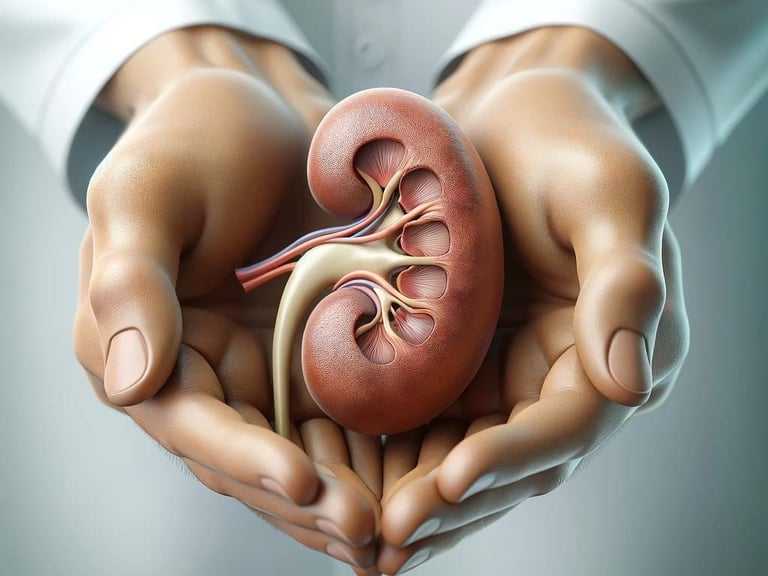Mini Percutaneous nephrolithotomy (PCNL)
CONDITIONS


Mini PCNL: A safer way to break large kidney stones
For larger kidney stones we have a technique that treats stones with minimal fuss and maximum safety: mini PCNL.
It’s less invasive, more precise, and—thanks to a few innovations like the use of thulium laser to break up stones and suction sheaths—it’s now better than ever.
A Keyhole Into the Kidney
Traditional PCNL (percutaneous nephrolithotomy) involves making a passage into the kidney to break up and remove stones. It’s been around for decades and works well, but the tools are fairly large. That can mean a greater chance of bleeding and longer recovery.
Mini PCNL is the same principle, but the instruments are much smaller. Imagine the difference between drilling a hole with a pencil-sized tool versus one the width of your thumb. The smaller tract means:
Less trauma to the kidney
Less bleeding
Quicker recovery
So, instead of dreading days in hospital, many of our patients are now home within 24–48 hours—and some even the same day.
The Thulium Laser: Dust, Don’t Smash
In the old days, stones were broken into chunks with a holmium laser. Effective, yes—but it often left behind fragments that needed fishing out.
Enter the thulium fibre laser. This laser “dusts” stones into fine powder that can be washed away or sucked out of the kidney, instead of creating big sharp fragments. It also doesn’t push stones around as much (imagine trying to hammer a pebble vs. sanding it down smoothly).
For patients, this means fewer leftovers, fewer repeat procedures, and shorter surgery times.
Suction Sheaths: A Built-In Vacuum Cleaner
Now, picture yourself drilling into a wall: dust flies everywhere, and you need to stop, clean up, and then carry on. That used to be surgery with stones too—breaking them up, then pausing to scoop out the pieces.
Suction-assisted sheaths have changed that. They let us break the stone and suck out the debris at the same time. It’s like having a tiny vacuum cleaner in the kidney.
The benefits are huge:
The kidney stays cleaner during surgery
The pressure inside the kidney is lower, which reduces the risk of infection
The whole process is quicker and smoother
Combined with the thulium laser, suction has made mini PCNL safer and more effective than ever before.
The Stent: A Little Helper After Surgery
Almost everyone who has mini PCNL goes home with a ureteric stent. Think of this as a temporary drainage: a soft tube that sits inside the ureter (the drainage tube from kidney to bladder).
Why bother with a stent? After surgery, the ureter can swell a little. The stent keeps urine flowing freely, prevents blockages, and gives the kidney time to heal without pressure building up.
At our hospitals, we nearly always use stents on strings. This simply means a fine thread is attached to the stent and left coming out through the urethra (the tube you pass urine through). After 3–5 days, the stent can be removed quickly, without an anaesthetic.
Some patients do notice the stent. It can cause a bit of bladder irritation or the feeling of needing to wee more often. And yes, you may notice the string when you go to the toilet. But it’s temporary and the strings allow easy removal of the ureteric stent
Our Way of Doing Things
Every centre does things slightly differently, but here’s how we look after our patients:
Before surgery: We ensure everyone has had a CT scan so we know exactly what we’re dealing with (the size, location and number of stones)
During surgery: We use a mini tract, the thulium laser to dust the stone, and suction to clear it. A stent is placed before finishing. Most patients will not have any other tubes. Some may have a catheter or a tube in the back (nephrostomy). This is rare.
After surgery: Most people stay 1–2 nights. A select few go home the same day.
Aftercare: The stent is removed after 3–5 days. Then, 2–3 months later, another CT scan checks that the stone is truly gone and whether any fragments remain.
Why Mini PCNL Instead of Standard PCNL?
Both procedures work but mini PCNL is often the better balance:
As effective as standard PCNL for many stones
Lower risk of bleeding
Shorter hospital stay
Less pain and quicker recovery
For very large or complex stones, standard PCNL still has a role, but for most patients, mini PCNL is safer option which offers a similar degree of stone clearance.
The patient journey
Here’s the journey in simple terms for most patients:
You come in for surgery and go to sleep with a general anaesthetic.
We make a pencil-sized channel into your kidney.
The stone is dusted into powder with the thulium laser while suction clears it away.
A stent is placed to protect the kidney.
You wake up, usually spend one night in the hospital, and go home with the stent.
The stent is removed 3–5 days later, using the attached string.
A CT scan 2–3 months later confirms you’re stone-free.
Simple, safe, and effective.
Frequently Asked Questions
Will I be in pain afterwards?
Most people describe mild discomfort in the side or back for a few days. It’s usually controlled with pain tablets.
What does the stent feel like?
Most patients notice a feeling of needing to pass urine more often and a dull ache. The string may feel unusual but is rarely painful.
How is the stent removed?
If it’s on a string, we simply pull it out after 3–5 days. It’s over in seconds and doesn’t need another operation.
When can I go back to work?
Most people return to light duties within a week. If your job is physical, give it a little longer.
Can the stones come back?
Yes, unfortunately. Some people are prone to forming stones. We often arrange tests to look for causes and give advice on diet and hydration to lower your risk.
Summary
Kidney stones are painful, but the surgery to remove them doesn’t have to be. With mini PCNL, the thulium laser, and suction technology, we can now clear stones in a way that’s safer and leads to faster recovery.
At our hospitals, we’ve made these advances standard and mini PCNL is the default starting point for most large kidney stone surgeries (usually more than 15 mm stones). With careful imaging, short-term stents, and close follow-up, our goal is simple: to get you stone-free with as little disruption to your life as possible.
If you’re facing kidney stone surgery, mini PCNL may be the one that gets you back to normal life fastest.
Further links
Information leaflet from the British Association of Urological Surgeons on PCNL
Animated video from the European Association of Urology (below)
Mr Ivo Dukic is one of the UK's premier PCNL surgeons and top kidney stone specialists, offering world-class urological care in Birmingham. As a distinguished Consultant Urologist with extensive expertise in high-volume kidney stone procedures, Mr Dukic is recognised as the leading PCNL expert in the West Midlands region.
Specialising in advanced Percutaneous Nephrolithotomy (PCNL) techniques, Mr Dukic delivers cutting-edge minimally invasive kidney stone treatments, including:
Vacuum-assisted access sheath Mini-PCNL procedures for optimal patient outcomes
Ultra-mini PCNL for reduced recovery times
Advanced endoscopic kidney stone removal using ureteral vacuum-assisted access sheaths
Complex renal stone surgery
All our PCNL surgery is carried out in the supine position (lying on your back) which allows us to perform complex surgery with multiple cameras in the kidney (endoscopic combined intrarenal surgery (ECIRS). This is done to try and maximise stone clearance in complicated stones.
His practice represents the gold standard in modern kidney stone surgery, combining years of specialist experience with the latest surgical innovations to provide patients across the UK with exceptional urological care and superior treatment outcomes.
You can schedule an appointment with him for expert, bespoke advice through his Top Doctors profile or book an appointment through Harborne Hospital, HCA Healthcare, the Priory Hospital, Edgbaston, Circle Health Group or Droitwich Spa, Circle Health.

Have any questions?


If you have any questions or wish to make an appointment please get in contact.
Ivo Dukic
Contacts
e-mail: admin@ivodukic.co.uk
Telephone number for private patients:
0121 716 9046
(Mondays to Fridays 0800 - 18:00)
For NHS patients seen at University Hospitals Birmingham NHS Hospitals please get in contact on
0121 424 9011
(Mondays to Fridays 0900 - 17:00)
ivodukic.co.uk
© 2026 UrolSurg LTD


